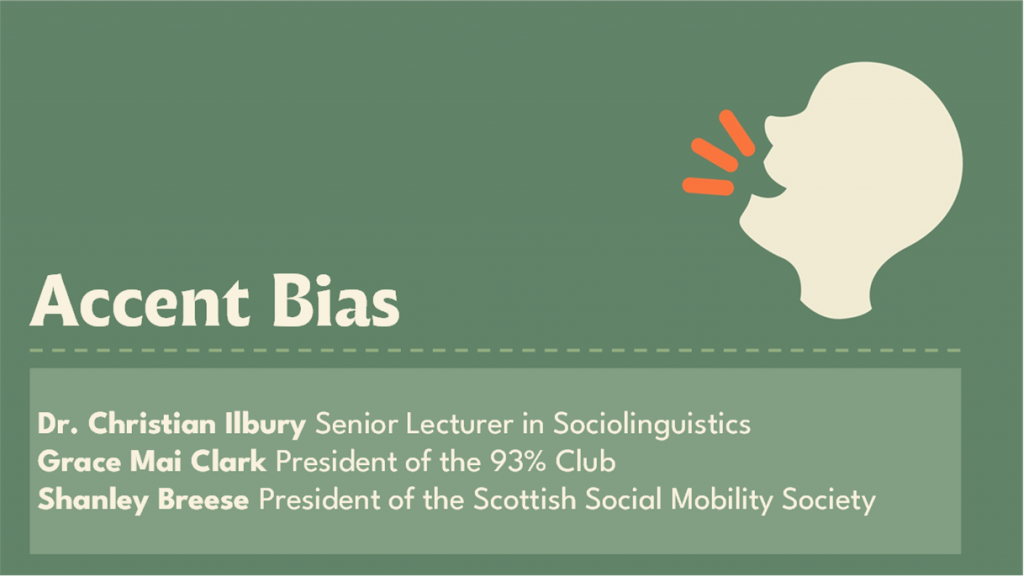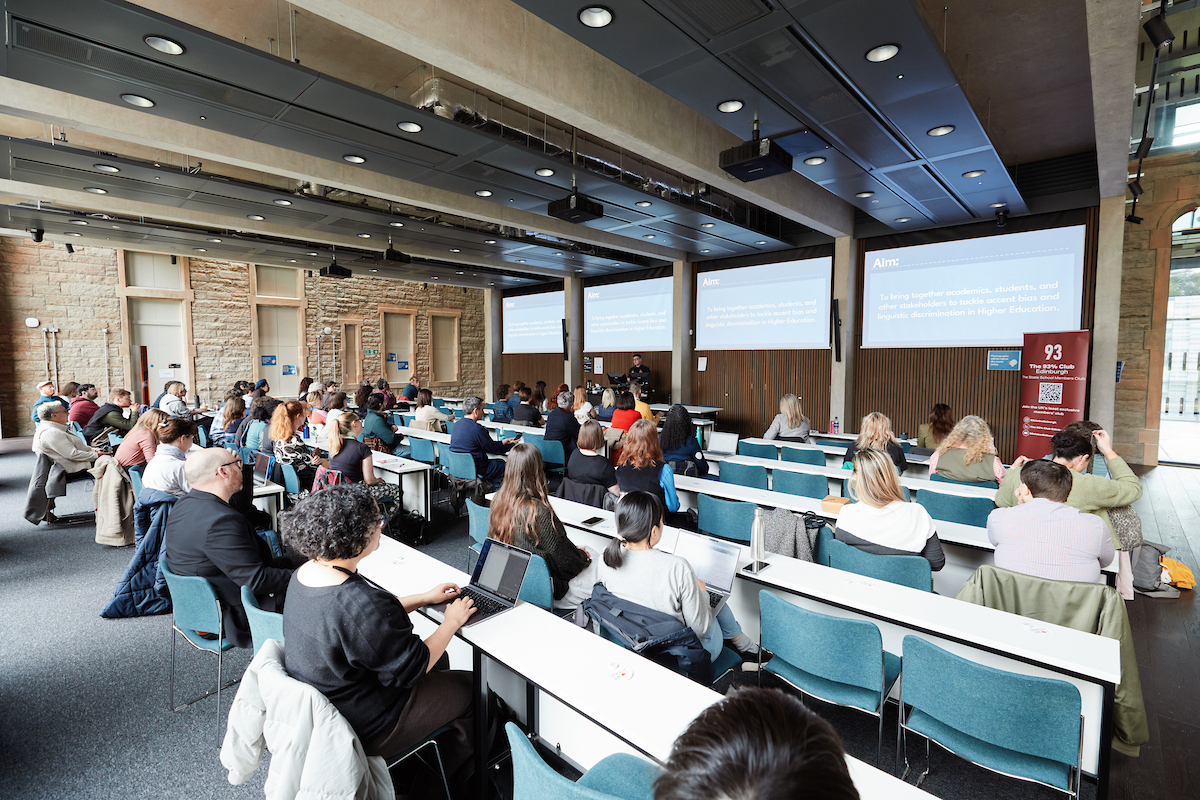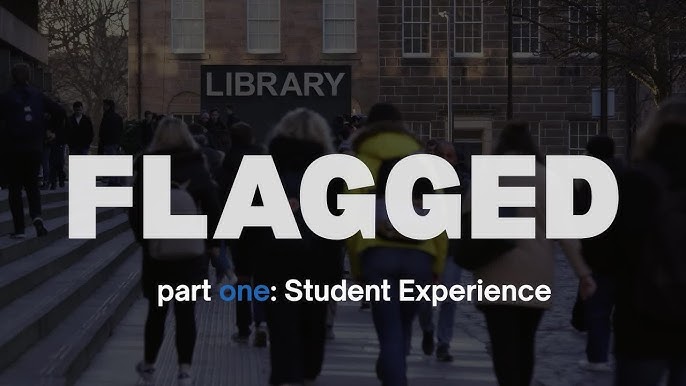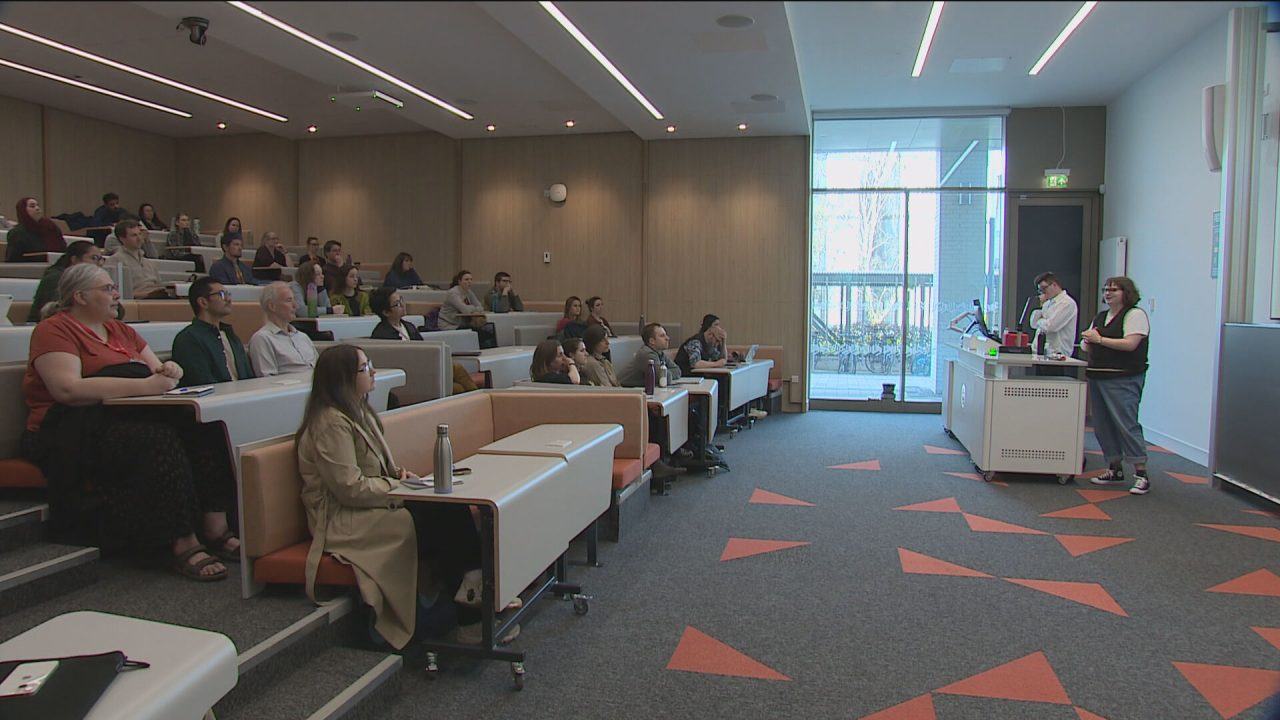Want to find out more? Here you’ll find some resources on accent bias and linguistic discrimination. If using these resources, please cite our research article: Ilbury, Clark & Breese (full reference below).

We have developed a training workshop for accent bias and linguistic discrimination which was introduced at UoE in 2022 – this makes us the first UK university to have explicit training on accent bias.
You can download the slides with workshop notes here.
In November 2023, and then again in April 2025, we ran a sell-out event: ‘Tackling Accent Bias at an Elite University’. We intend on running future events, which you can be part of. Please get in touch if you’d like to collaborate on this.
The 93% Club recorded the 2025 panel discussion as podcast which can be accessed here.


In 2025, we co-authored a research article and a book chapter which are both under review. When published, they will be available Open Access here.
In 2025, the Scottish Social Mobility Society released ‘Flagged’ which documents Scottish students’ experiences on campus, including accent bias and linguistic discrimination.
Part one can be accessed here and part two here.


Want us to lead a workshop or need our input on training? Contact cilbury@ed.ac.uk
Please cite “Ilbury, C., G. Clark, S. Breese. Under review. A student-staff approach to tackling linguistic discrimination in Higher Education” if using these resources.
External Resources
Related projects
Academic references
- Accent Bias Britain (2019) Preventing Accent Bias in Hiring: Summary of Interventions Strategies Tested <https://accentbiasbritain.org/wp-content/uploads/2019/12/Intervention_Strategies_Annexe.pdf> accessed 22.10.2025.
- Baker Bell, A. (2020) Linguistic Justice: Black Language, Literacy, Identity, and Pedagogy. Abingdon: Routledge.
- Baratta, A. (2016) ‘Keeping it real or selling out: The effects of accent modification on personal identity’, Pragmatics and Society 7 (2): 291-319.
- Burnell Reilly, I. (2024) ‘Tales of the unexpected: The lives and experiences of working-class academics’, Higher Education Quarterly, 78(3): 1190-1201.
- Clements, G. & M. J. Petray (2021). Linguistic Discrimination in US Higher Education Power, Prejudice, Impacts, and Remedies. Routledge: Abingdon.
- Cushing, I. & J. Snell (2023) ‘The (white) ears of Ofsted: a raciolinguistic perspective on the listening practices of the schools inspectorate’, Language in Society, 52 (3): 363–386.
- Dovchin, S. (2020) ‘The psychological damages of linguistic racism and international students in Australia’, International Journal of Bilingual Education and Bilingualism, 23(7): 804–818.
- Dovchin, S., Q. Gong, T. Dobinson, & M. McAlinden (2024) Linguistic Diversity and Discrimination Autoethnographies from Women in Academia. Abingdon: Routledge.
- Gu, Y. & A. P. Shah (2019) ‘A systematic review of interventions to address accent-related communication problems in healthcare’, The Ochsner Journal, 19(4):378–396.
- Hindle, C., V. Boliver, A. Maclarnon, C. McEwan, B. Simpson and H. Brown (2021) ‘Experiences of first-generation scholars at a highly selective UK university’, Learning and Teaching, 14(2): 1-31.
- Jerrim, J. (2013). Family Background and Access to ‘High Status’ Universities. London: The Sutton Trust.
- Levon, E., D. Sharma, D. Watt, A. Cardoso & Y. Ye (2021) ‘Accent bias and perceptions of professional competence in England’, Journal of English Linguistics, 49(4): 355-388.
- Page, C. (2023) ‘Academic language development and linguistic discrimination: Perspectives from internationally educated students’, Comparative and International Education, 52 (2): 39-53.
- Parveen, N. (2020) ‘It’s had a lasting impact’: students on being bullied over their accents. The Guardian. <https://www.theguardian.com/education/2020/oct/24/its-had-a-lasting-impact-students-on-being-bullied-over-their-accents> accessed 22.10.2025
- Piller, I. (2016) Linguistic Diversity and Social Justice. Cambridge: CUP.
- Tomé Lourido, G. & J. Snell (under review) ‘Accent bias and inequities in higher education: A critical perspective on university students’ experiences of accent-based disadvantages’
- Wolfram, W. (2023) ‘Addressing linguistic inequality in higher education: A proactive model’, Daedalus, 152(3):36-51.
